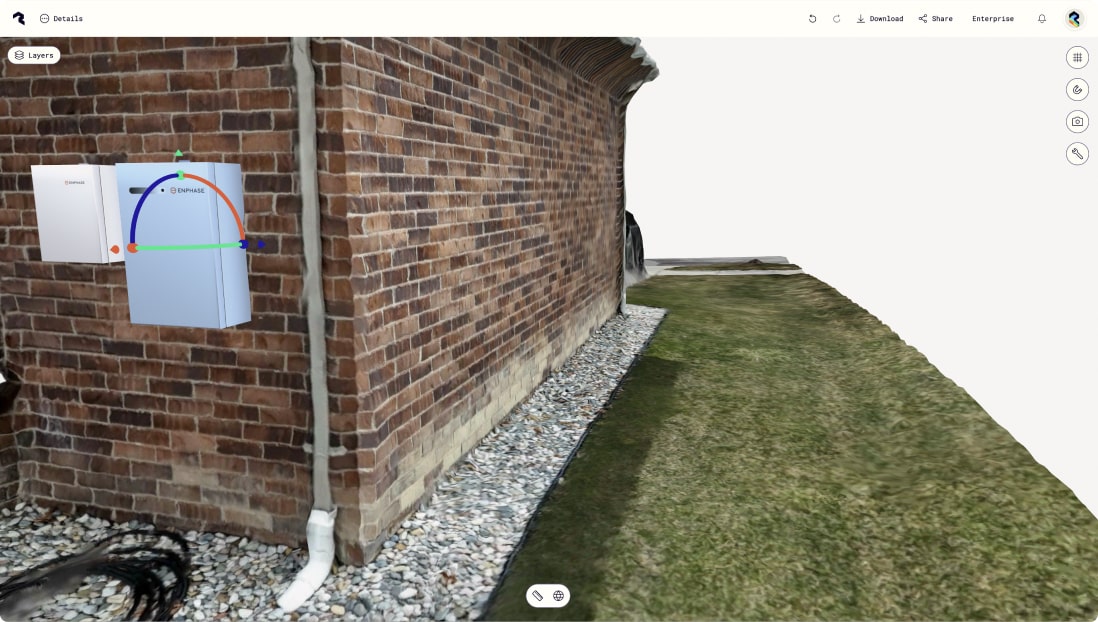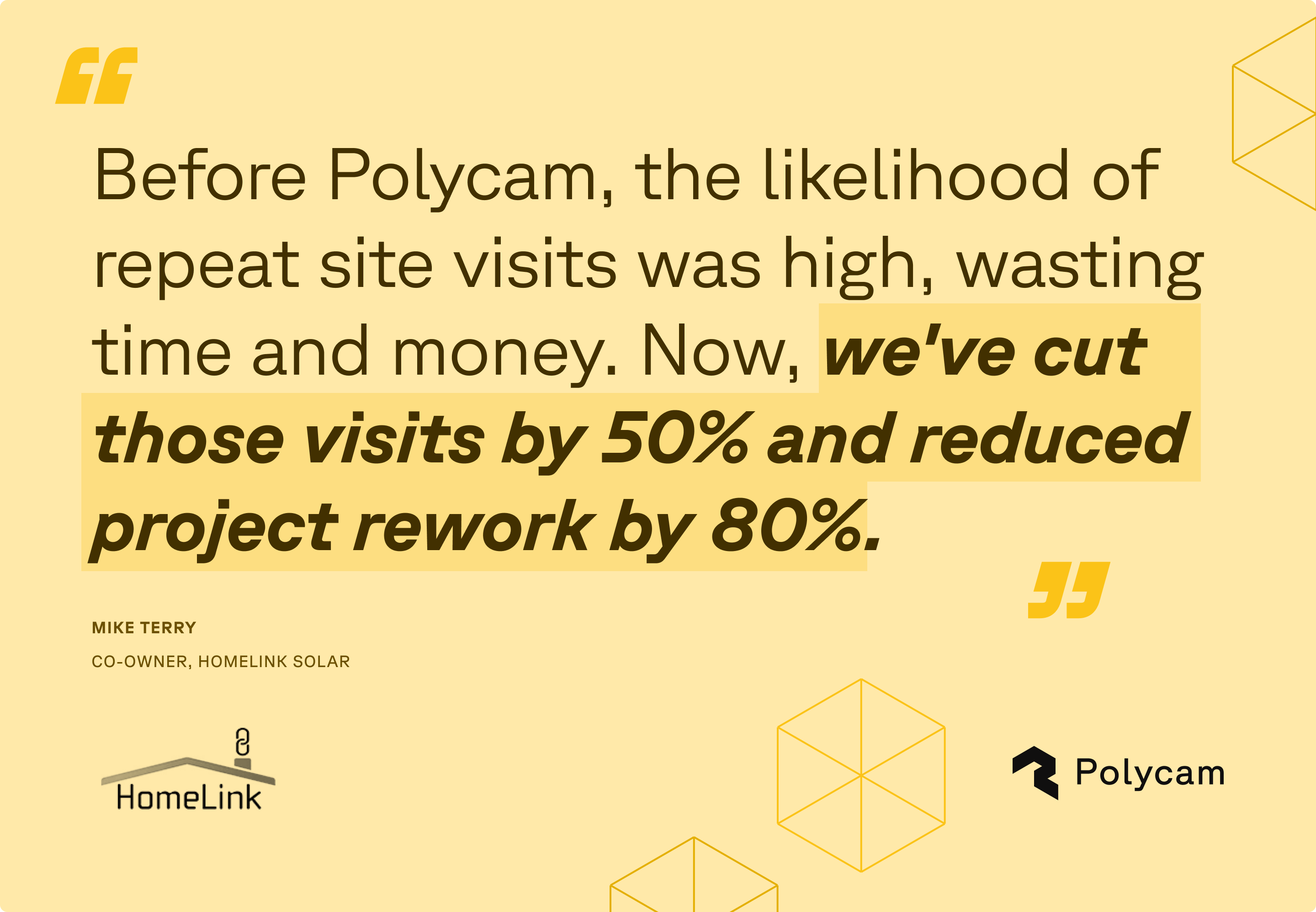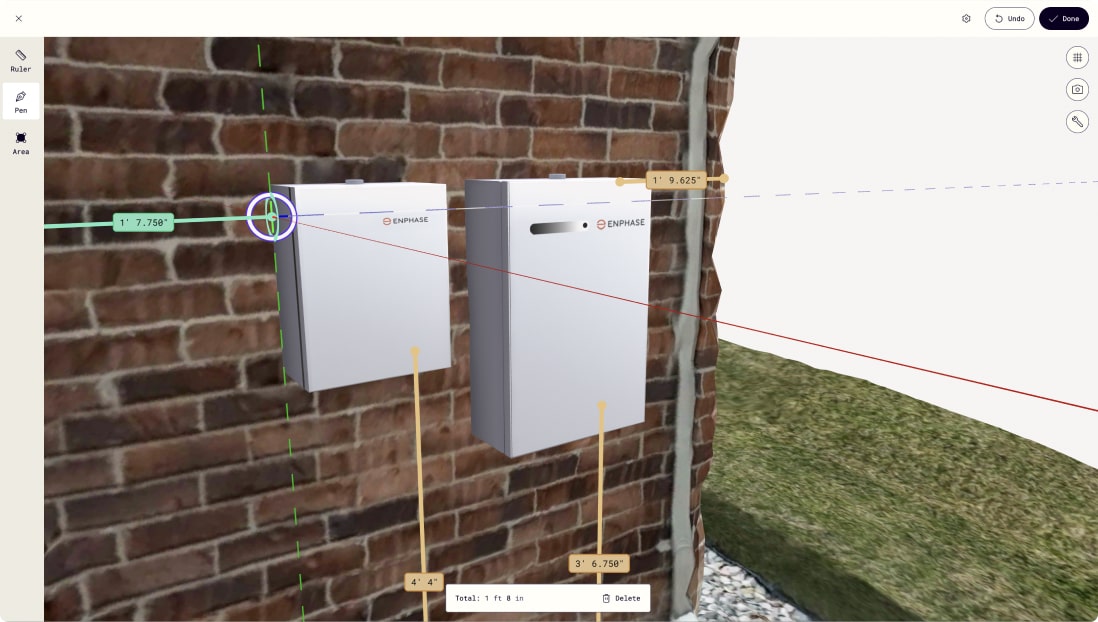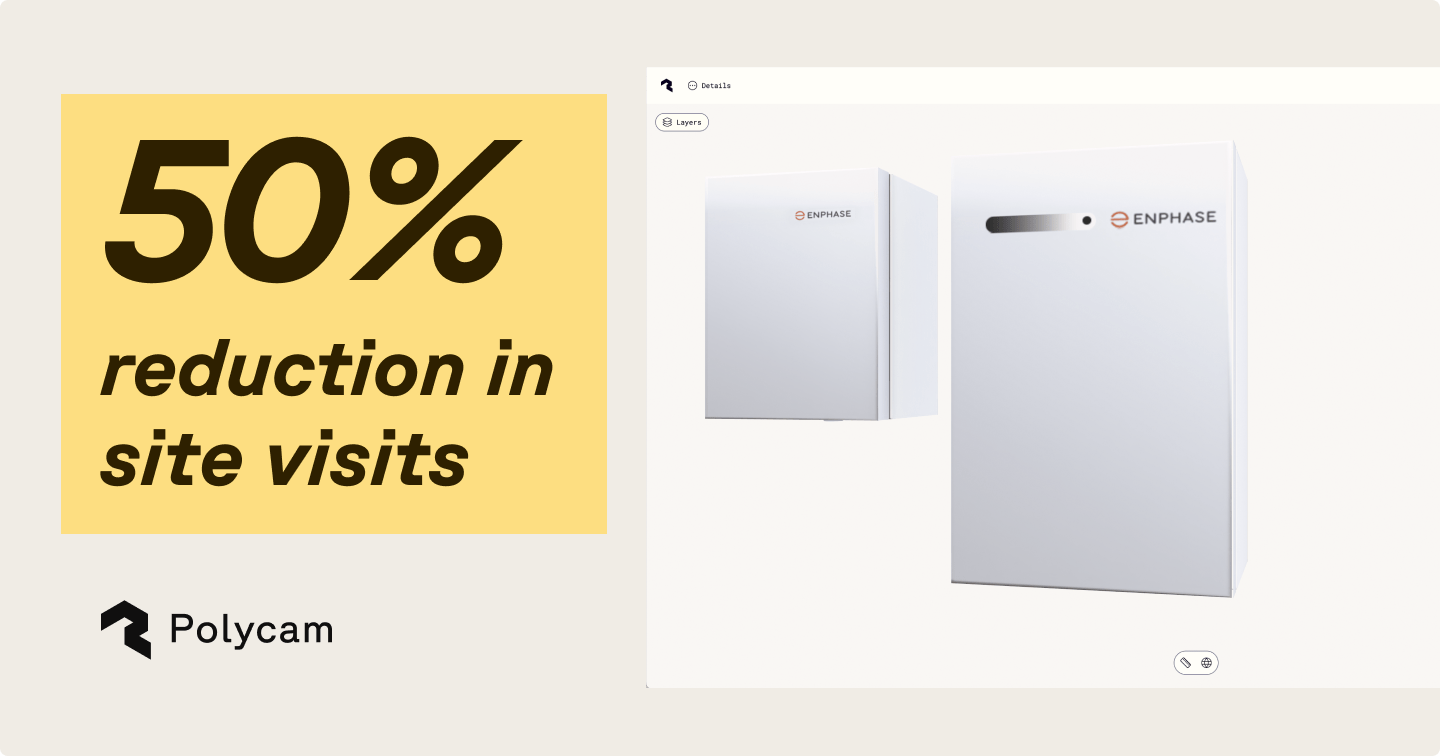

reduction in project rework
monthly savings in operational costs
reduction in site visits
Lorem ipsum dolor sit amet, consectetur adipiscing elit, sed do eiusmod tempor incididunt ut labore et dolore magna aliqua. Ut enim ad minim veniam, quis nostrud exercitation ullamco laboris nisi ut aliquip ex ea commodo consequat. Duis aute irure dolor in reprehenderit in voluptate velit esse cillum dolore eu fugiat nulla pariatur.
Block quote
Ordered list
Unordered list
Bold text
Emphasis
Superscript
Subscript
reduction in project rework
monthly savings in operational costs
reduction in site visits

From floor plans to drone mapping, Polycam makes 3D scanning simple for teams of any size.
For Mike Terry and his partner Mandy Rami, co-owners of HomeLink Solar, navigating California’s chaotic solar market is a daily challenge. Faced with fluctuating interest rates, evolving fire policies, and shifting regulations, their solution is to pioneer a new standard for precision. “We’re all navigating the same operational hurdles,” Terry observes. “It’s about finding practical solutions that streamline processes and cut costs.”
In a sector where tight margins and accuracy are paramount, HomeLink Solar is leading the charge. They’re powered by Polycam, which turns a smartphone into a mobile LiDAR scanner for capturing detailed 3D models of any space—inside or out.
The solar energy storage market is undergoing record-breaking expansion. The latest U.S. Energy Storage Monitor report from Wood Mackenzie and the American Clean Power Association forecasts that 15 GW of storage will be installed in 2025 alone, a 25% increase over 2024. With battery storage becoming an increasingly vital component of solar systems, installers are under pressure to optimize their installation workflows. "Battery sales are vital to our business and are a critical source of add-on work," Terry states. "Accurate placement is crucial, not just for aesthetics but for safety and efficiency. Missed details result in repeat visits, which drastically cut into already thin margins. Overhead costs snowball with each return trip, eroding profitability."
Companies like SolarGraf and Aurora Solar have revolutionized rooftop solar design. These platforms utilize high-resolution aerial imagery, captured by satellites and airplanes, enabling installers to create precise plans of roofs, optimize panel placement, and generate detailed financial analyses and estimates. Installers work within these programs daily, designing systems, creating customer proposals, and generating the required permitting documents. "These tools have brought tremendous efficiency to rooftop solar planning," Terry acknowledges. "However, they don't address the challenge of accurately capturing the intricacies of side-of-house battery installations."

Before mobile LiDAR, installers relied on traditional tools that often fell short, and many still do. "We'd spend hours taking photos and measurements, often missing critical details like pipe placements or ground slopes," Terry says. "Photos lacked accurate dimensions, and manual measurements were time-consuming and prone to human error."
Terrestrial scanners, while precise, are prohibitively expensive and cumbersome, making them impractical for most installers. Street View, while readily accessible, does not capture the interior of garages or the fine details needed for accurate measurements, and fails to capture elevation changes. All of these methods lead to missed details and costly return trips. "The simple truth is, the available technology wasn't built for the practical challenges of a battery installation," Terry explains. "Before Polycam, the likelihood of repeat site visits was high, wasting time and money."

By integrating Polycam, HomeLink Solar replaced a cumbersome, error-prone process with a streamlined digital workflow that anyone on the team can execute.
1. Capture the Site in Minutes
A HomeLink team member simply walks the property using an iPhone with Polycam’s LiDAR Space Mode. As they move, the app instantly generates a dimensionally accurate 3D model of the home's exterior, garage, and electrical panel location in real-time. "We capture the entire space, including elevation changes, and Polycam generates spatial data reports and floor plans that everyone on the team can use,” says Terry. “This single, rapid scan eliminates the need for manual measurements and prevents missed details.”
2. Build a Reusable 3D Library
To streamline design, HomeLink created a permanent library of digital twins. Using Polycam's Object Mode, they captured dimensionally accurate 3D replicas of their most-used components—including specific Enphase batteries and control panels. "We scanned each component, capturing every detail to create a precise digital representation," Terry explains. These models are a one-time creation, stored in their library for reuse across all future projects.
3. Design, Validate, and Share
Once the site is captured, the remote design team opens the 3D scan in Polycam's Scene Editor. They pull the required Enphase components from their 3D library and place them directly into the model, experimenting with layouts to ensure a perfect fit. This integrated process has completely replaced their previous workflow, which required specialized skills and time-consuming modeling in SketchUp. "Polycam streamlines battery design tasks, saving us significant time and expense," Terry notes. The final design is then shared with the homeowner as a 2D or 3D visualization for clear communication and fast approval.
"It's a night-and-day difference," Terry adds. "Now, we've cut those visits by 50% and reduced project rework by 80%."
Terry believes the next step in efficiency lies in connecting ground-level data with the aerial data already used by the industry. He envisions platforms like Aurora and SolarGraf integrating Polycam’s site scans to create a complete digital picture of a project. "Integrating these tools would create an even more seamless and efficient ecosystem for solar installers," Terry says.
His vision extends even further, to a future powered by AI. He imagines a system analyzing Polycam scans against a home's energy data to identify the perfect candidates for an upsell. Imagine an AI pinpointing homes ripe for a battery upgrade, streamlining targeted marketing.
By sharing their workflow, HomeLink is providing a practical blueprint for their peers. They are demonstrating how simple technology and future AI advancements can elevate the entire solar community. “We're happy to share and help envision how practical tech can make everyone's job easier,” says Terry.

See how Space Mode maps every detail for a side-of-house battery install.
Finalize your solar battery layout by placing 3D components using the Polycam Scene Editor.
Instantly kickstart your SketchUp solar designs with the new Polycam extension.
Lorem ipsum dolor sit amet, consectetur adipiscing elit, sed do eiusmod tempor incididunt ut labore et dolore magna aliqua. Ut enim ad minim veniam, quis nostrud exercitation ullamco laboris nisi ut aliquip ex ea commodo consequat. Duis aute irure dolor in reprehenderit in voluptate velit esse cillum dolore eu fugiat nulla pariatur.
Block quote
Superscript
Bold text
Emphasis
Subscript
From floor plans to drone mapping, Polycam makes 3D scanning simple for teams of any size.

